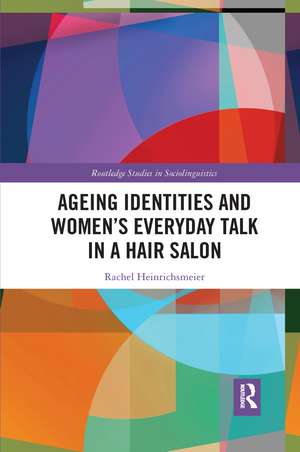Ageing Identities and Women’s Everyday Talk in a Hair Salon: Routledge Studies in Sociolinguistics
Autor Rachel Heinrichsmeieren Limba Engleză Paperback – 30 sep 2021
| Toate formatele și edițiile | Preț | Express |
|---|---|---|
| Paperback (1) | 366.35 lei 6-8 săpt. | |
| Taylor & Francis – 30 sep 2021 | 366.35 lei 6-8 săpt. | |
| Hardback (1) | 1159.94 lei 6-8 săpt. | |
| Taylor & Francis – 16 ian 2020 | 1159.94 lei 6-8 săpt. |
Din seria Routledge Studies in Sociolinguistics
-
 Preț: 203.92 lei
Preț: 203.92 lei -
 Preț: 311.41 lei
Preț: 311.41 lei -
 Preț: 310.03 lei
Preț: 310.03 lei -
 Preț: 152.25 lei
Preț: 152.25 lei - 9%
 Preț: 934.83 lei
Preț: 934.83 lei -
 Preț: 332.07 lei
Preț: 332.07 lei -
 Preț: 279.03 lei
Preț: 279.03 lei -
 Preț: 311.18 lei
Preț: 311.18 lei - 18%
 Preț: 1000.27 lei
Preț: 1000.27 lei -
 Preț: 389.38 lei
Preț: 389.38 lei - 18%
 Preț: 1007.36 lei
Preț: 1007.36 lei - 30%
 Preț: 846.92 lei
Preț: 846.92 lei - 18%
 Preț: 1000.27 lei
Preț: 1000.27 lei -
 Preț: 416.22 lei
Preț: 416.22 lei - 5%
 Preț: 1159.94 lei
Preț: 1159.94 lei - 21%
 Preț: 257.49 lei
Preț: 257.49 lei -
 Preț: 389.38 lei
Preț: 389.38 lei - 18%
 Preț: 996.83 lei
Preț: 996.83 lei - 18%
 Preț: 1005.80 lei
Preț: 1005.80 lei -
 Preț: 449.41 lei
Preț: 449.41 lei -
 Preț: 380.84 lei
Preț: 380.84 lei - 18%
 Preț: 1003.72 lei
Preț: 1003.72 lei - 26%
 Preț: 764.30 lei
Preț: 764.30 lei -
 Preț: 393.26 lei
Preț: 393.26 lei - 18%
 Preț: 999.02 lei
Preț: 999.02 lei - 26%
 Preț: 845.69 lei
Preț: 845.69 lei - 26%
 Preț: 764.20 lei
Preț: 764.20 lei -
 Preț: 416.22 lei
Preț: 416.22 lei - 25%
 Preț: 775.30 lei
Preț: 775.30 lei - 18%
 Preț: 1000.27 lei
Preț: 1000.27 lei -
 Preț: 483.12 lei
Preț: 483.12 lei -
 Preț: 428.46 lei
Preț: 428.46 lei - 30%
 Preț: 847.73 lei
Preț: 847.73 lei - 18%
 Preț: 1011.19 lei
Preț: 1011.19 lei - 25%
 Preț: 824.89 lei
Preț: 824.89 lei - 17%
 Preț: 259.98 lei
Preț: 259.98 lei - 15%
 Preț: 455.31 lei
Preț: 455.31 lei - 18%
 Preț: 1110.74 lei
Preț: 1110.74 lei
Preț: 366.35 lei
Preț vechi: 385.62 lei
-5% Nou
Puncte Express: 550
Preț estimativ în valută:
70.10€ • 73.39$ • 58.00£
70.10€ • 73.39$ • 58.00£
Carte tipărită la comandă
Livrare economică 05-19 aprilie
Preluare comenzi: 021 569.72.76
Specificații
ISBN-13: 9781032175843
ISBN-10: 1032175842
Pagini: 264
Ilustrații: 9 Illustrations, black and white
Dimensiuni: 152 x 229 x 14 mm
Greutate: 0.36 kg
Ediția:1
Editura: Taylor & Francis
Colecția Routledge
Seria Routledge Studies in Sociolinguistics
Locul publicării:Oxford, United Kingdom
ISBN-10: 1032175842
Pagini: 264
Ilustrații: 9 Illustrations, black and white
Dimensiuni: 152 x 229 x 14 mm
Greutate: 0.36 kg
Ediția:1
Editura: Taylor & Francis
Colecția Routledge
Seria Routledge Studies in Sociolinguistics
Locul publicării:Oxford, United Kingdom
Notă biografică
Rachel Heinrichsmeier is a Visiting Research Fellow at King’s College London. Her research focusses on identity construction in interaction, particularly older-age, gender and institutional identities, and combines a conversation analytic-informed discourse analysis with ethnographic methods.
Cuprins
List of figures
List of tables
Acknowledgements
Transcription notation
Abbreviations
Introduction
Chapter 1 Ageing in society and in interaction
Chapter 2 Researching identities in a hair salon
Chapter 3 Ageing: Manoeuvring around decline
Chapter 4 Not only old: Negotiating ageing in salon talk
Chapter 5 First impressions
Chapter 6 Negotiating stances to appearance
Chapter 7 Ageing well in stories of daily life
Chapter 8 Being more than ‘older women’
Chapter 9 Looking back, looking forward
References
Index
List of tables
Acknowledgements
Transcription notation
Abbreviations
Introduction
Chapter 1 Ageing in society and in interaction
Chapter 2 Researching identities in a hair salon
Chapter 3 Ageing: Manoeuvring around decline
Chapter 4 Not only old: Negotiating ageing in salon talk
Chapter 5 First impressions
Chapter 6 Negotiating stances to appearance
Chapter 7 Ageing well in stories of daily life
Chapter 8 Being more than ‘older women’
Chapter 9 Looking back, looking forward
References
Index
Recenzii
"This inspiring book, full of living narratives of older women, invites readers to think critically about ageing against a background of increasing longevity." - Jing Wu, University of Gothenburg, Ageing and Society
"[This book] makes a convincing case for approaching ageing and age identity as contextual, co-constructed by participants, and as intersecting with other aspects of our identities...I highly recommend the book for anyone interested in talk and (age) identity constructions, women and ageing, or the application of CA/MCA/IS on talk and interaction." - Virpi Ylänne, Cardiff University, Journal of Pragmatics
"[This book] makes a convincing case for approaching ageing and age identity as contextual, co-constructed by participants, and as intersecting with other aspects of our identities...I highly recommend the book for anyone interested in talk and (age) identity constructions, women and ageing, or the application of CA/MCA/IS on talk and interaction." - Virpi Ylänne, Cardiff University, Journal of Pragmatics
Descriere
Heinrichsmeier presents the results of her two-year sociolinguistic study examining how a group of older women of different ages negotiated their way through their own and others’ expectations of ageing and constructed different kinds of older – and other – identities for themselves.
